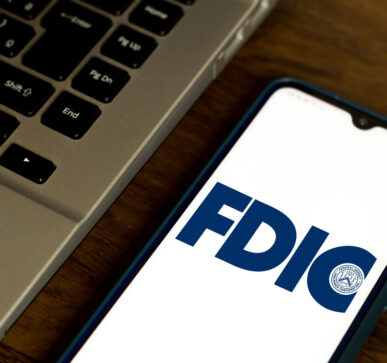On 7/29/22, the FDIC published a Crypto Advisory: “Advisory to FDIC-Insured Institutions Regarding Deposit Insurance and Dealings with Crypto Companies” due to its concern regarding the confusion that consumers have regarding Crypto assets “offered by, through, or in connection with insured depository institutions (insured banks)”. Crypto assets are not legal tender (not fiat currency) and are NOT backed by the full faith and credit of the Government. Crypto asset accounts and value balances “offered by, through, or in connection with insured depository institutions (insured banks) are not covered by FDIC insurance or SIPIC (Securities Investor Protection Corporation) protection. Crypto investors ought to realize that there is NO Regulatory Agency that oversees crypto – You are on your own! That said, insured banks ought to recognize that consumer confusion stemming from Crypto misrepresentation can lead to a Corporate Governance threats that can result in legal, liquidity and capital risks.
Why the consumer confusion? Inaccurate representation!
The Crypto market has recently suspended withdrawals or simply stopped operating. Crypto prices have plunged, jobs have disappeared, and some firms are under the eye of federal regulators. This type of market activity coupled with all the media reports and coverage have given a rise to further consumer confusion. For example, the FDIC states that there is a risk of consumer perception when a non-bank entity offers crypto assets to the non-bank’s customers, while simultaneously offering an insured bank’s deposit products. The inaccurate representations stems from deposit insurance by non-banks, (including crypto companies), that may confuse the non-bank’s customers and cause those customers to mistakenly believe they are protected against any type of loss. As a result, non-bank customers may not understand the role of the bank as it relates to the activities of the nonbank, or the speculative nature of certain crypto assets as compared to deposit products. In sum, the FDIC’s concern stems from the reality that the customers of Crypto companies (defined by the FDIC as crypto custodians, exchanges, brokers, wallet providers, and neobanks) may be under the false belief that they are covered by FDIC insurance.
FDIC issues a Fact Sheet to address some common misconceptions
The Fact Sheet issued by the FDIC wants consumers to know the following:
- In the unlikely event of an insured-bank failure, the FDIC protects depositors of insured banks against the loss of their deposits, up to at least $250,000. By federal law, the FDIC only insures deposits held in insured banks and savings associations (collectively, “insured banks”) and only in the unlikely event of an insured bank’s failure. The FDIC does not insure assets issued by non-bank entities, such as crypto companies.
- Since the FDIC began insuring deposits in 1934, no depositor has lost a penny of FDIC-insured funds as a result of an insured bank’s failure.
- Deposit insurance applies to products such as checking accounts, savings accounts, and certificates of deposit held at insured banks. (https://www.fdic.gov/resources/deposit-insurance/financial-productsinsured/index.html)
- The FDIC only pays deposit insurance after an insured bank fails. Coverage is only available for the deposits that are held in the insured bank at the time of its failure
Understanding what is NOT covered by the FDIC
- FDIC deposit insurance does not apply to financial products such as stocks, bonds, money market mutual funds, other types of securities, commodities, or crypto assets.
- FDIC deposit insurance does not protect against losses due to theft or fraud, which are addressed by other laws.
- FDIC insurance does not protect against the default, insolvency, or bankruptcy of any non-bank entity, including crypto custodians, exchanges, brokers, wallet providers, and neobanks.
Consumer confusion can turn out be a “Corporate Governance Risk” for Insured Banks
Here is the risk management and governance considerations message from the FDIC to insured banks as per the Crypto Advisory:
- Insured banks need to be aware of how FDIC insurance operates and need to assess, manage, and control risks arising from all third-party relationships, including those with crypto companies.
- In their dealings with crypto companies, insured banks should confirm and monitor that these companies do not misrepresent the availability of deposit insurance in order to measure and control risks to the bank and should take appropriate action to address such misrepresentations.
- Communications related to deposit insurance need to be clear and conspicuous. Nonbank entities, such as crypto companies, that advertise or offer FDIC-insured products in relationships with insured banks could reduce consumer confusion by clearly, conspicuously: (a) stating that they are not an insured bank; (b) identifying the insured bank(s) where any customer funds may be held on deposit; and (c) communicating that crypto assets are not FDIC-insured products and may lose value.
- Insured banks that are involved in relationships with non-bank entities that offer deposit products as well as non-deposit products, such as crypto assets, can help minimize customer confusion and harm by carefully reviewing and regularly monitoring the nonbank’s marketing material and related disclosures to ensure accuracy and clarity.
- For safe and sound operation, the insured bank should have appropriate risk management policies and processes to ensure that any services provided by, or deposits received from any third-party, including a crypto company, are, and remain, in compliance with all laws and regulations.
- In addition, Part 328, Subpart B of the FDIC’s Rules and Regulations titled False Advertising, Misrepresentation of Insured Status, and Misuse of the FDIC’s Name or Log, can apply to non-banks, such as crypto companies. Accordingly, insured banks should determine if its third-party risk management policies and procedures effectively manage crypto-asset-related risks, including compliance risks related to Part 328 Subpart B.
How are you assessing, managing, and controlling the risks arising from third-party relationships, including those with crypto companies?
Who is your Corporate Governance Expert Service Provider? ©





